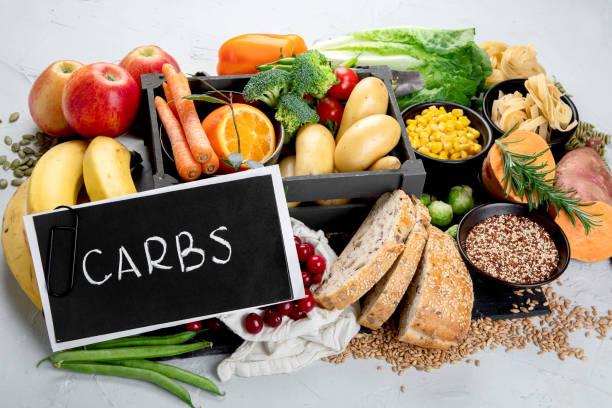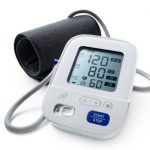The ONE organ responsible for high blood pressure.
7 Carbs You Should Be Buying for Better Blood Pressure

Approximately 1 in every 3 U.S. adults has high blood pressure, putting them at an increased risk of stroke, heart attack and other undesired outcomes. When a person is diagnosed with high blood pressure, the first diet tip that is typically given is to limit the consumption of dietary sodium. And while keeping the saltshaker-shaking to a minimum is probably a good idea, there are many other factors that play into supporting healthy blood pressure levels.
Most notably, following the Dietary Approaches to Stop Hypertension, or DASH, diet, has been shown to lower blood pressure significantly. The DASH diet emphasizes foods like whole grains, vegetables, fruits, nonfat or low-fat milk and dairy foods, lean meat, poultry, fish, nuts, seeds, legumes and healthy fats. Sodium intake should be limited to 2,300 milligrams per day, and consuming foods that contain the minerals calcium, magnesium and potassium is encouraged.
Do you love Carbs?
If you are a carb lover and have high blood pressure, the good news is that the DASH diet includes several carb-rich foods, so you don't have to eschew your favorite macro when trying to manage your health. Instead of going carb-free, opting for plant-based carbohydrate-containing foods such as fruits, vegetables and whole grains may help lower blood pressure in a natural way. Conversely, too many added sugars from foods like sugar-sweetened beverages are associated with higher blood pressure levels and higher hypertension risk.
Limiting ultra-processed and highly refined carbs like doughnuts and candy and focusing on carbs that are more nutrient-dense and complex is a good rule of thumb when navigating your carb choices.
7 Carbs You Should Be Buying for Better Blood Pressure
While most fruits, whole grains and other good-for-you carb choices are generally a great addition to your blood-pressure-friendly diet, there are some specific choices that offer unique benefits and make them some of the best carbs to include in your diet if you want better blood pressure.
1. Bananas
The darling of the potassium-containing foods, bananas are one of the best carb-rich foods to eat to support healthy blood pressure. Since the American Heart Association recommends that adults with blood pressure above 120/80 increase their dietary potassium intake, including bananas in your eating pattern is a smart choice.
Of course, you can enjoy a banana simply by peeling it and eating it when you are on the go. But you can also whip up some Tart Cherry Nice Cream or a chocolate-banana protein smoothie to help you add in some extra potassium.
2. Beans
Beans offer some natural carbs along with plant-based protein and a slew of vitamins and minerals, including healthy blood-pressure-supporting magnesium. Plus, the soluble and insoluble fiber, including resistant starch naturally found in beans, can help support blood pressure control.
According to a meta-analysis published in the American Journal of Hypertension, people who ate more beans and lentils experienced a reduction in systolic blood pressure (the number on the top of the blood pressure fraction), regardless of whether they had a diagnosis of hypertension. In fact, eating an average of 1 2/3 daily servings of dietary pulses, including beans, over the median 10-week study period, significantly lowered systolic blood pressure by 2.25 mm Hg.
3. Yogurt
Yogurt has become a popular food among the gut-health-supporting crowd, thanks to its live and active cultures that can help maintain a balanced microbiome. But yogurt is so much more than a probiotic-packed dairy food.
When it comes to blood-pressure support, findings published in the International Dairy Journal showed that, among a small sample of people with high blood pressure, the simple act of eating yogurt may help reduce those numbers. Dairy yogurt naturally contains the trifecta of the healthy blood-pressure-supporting minerals calcium, magnesium and potassium. Plus, the probiotics found in yogurt may play a separate role in reducing blood pressure, according to a review of clinical trials, published in Hypertension.
Yogurt can be used to make various dishes, from a Mini Frozen Yogurt Parfait to a refreshing Fruit & Yogurt Smoothie. Of course, yogurt can simply be enjoyed on its own, topped with fresh berries and a drizzle of honey.
4. Dates
Dates can be a perfect solution for people who want to satisfy a sweet tooth without any added sugar, thanks to the naturally sweet, caramel taste these fruits offer. And, as an added bonus, noshing on these fruits can support healthy blood pressure. Between the fiber, potassium and magnesium that this carb source provides, dates are a natural addition to a heart-healthy diet.
Dates can be enjoyed on their own, or they can be used in many recipes, like Almond-Stuffed Dates and Vegan Date Brownies.
5. Oats
Whole grains, like oats, are better options to support a healthy blood pressure when it comes to grain choices. Unlike refined grains that typically only contain the endosperm of the grain, whole grains contain all three parts of the grain—the bran, endosperm and germ—giving these foods a nutritional edge. Whole grains contain more abundant and diverse nutrients with potential health benefits, including more fiber, vitamins and minerals compared with most of their refined counterparts.
Eating plenty of fiber-rich whole grains might also reduce the risk of hypertension by giving a boost to your gut microbiota. Oats may be especially valuable because they contain a type of fiber called beta-glucans. Eating this type of fiber has been linked to both lower systolic and lower diastolic blood pressure.
6. Blueberries
Adding a cup of blueberries to your daily diet may do more than offer a flavorful boost with no added sugar. According to a recent study published in the Journals of Gerontology, eating around 1 cup of wild blueberries (the slightly smaller blueberries that are typically found frozen in your grocery store) every day may help reduce systolic blood pressure.
Blueberries contain fiber, vitamins and minerals, nutrients which can help support a person's cardiovascular and overall health. And like many other naturally blue or purple foods, blueberries contain anthocyanins, a polyphenol that gives these foods that beautiful colorful hue and may account for the blood pressure benefits that have been observed. While wild blueberries contain more anthocyanins than cultivated blueberries, all blueberries pack a serious anthocyanin punch.
No matter whether you are enjoying Blueberry-Lemon Energy Balls or a Blueberry Almond Chia Pudding, you can feel good about eating something that supports healthy blood pressure naturally.
7. Orange Juice
Sipping on a glass of 100% orange juice can do much more for you than support your immune system. Pure OJ is a natural so
urce of potassium, one of the highlighted minerals of the DASH diet. Citrus fruits, like the oranges used to make 100% OJ, contain an antioxidant called hesperidin. This antioxidant may play a role in supporting heart health in various ways.
In one randomized controlled trial, people with either stage 1 or pre-hypertension who consumed 500 milliliters of orange juice daily for 12 weeks had significantly reduced systolic blood pressure compared with those who drank a hesperidin-free drink with the same amount of calories, vitamin C and citric acid.
Sipping on a Berry Orange Smoothie or an Orange-Earl Grey Iced Tea can give you a boost of hesperidin in a delicious vessel.









